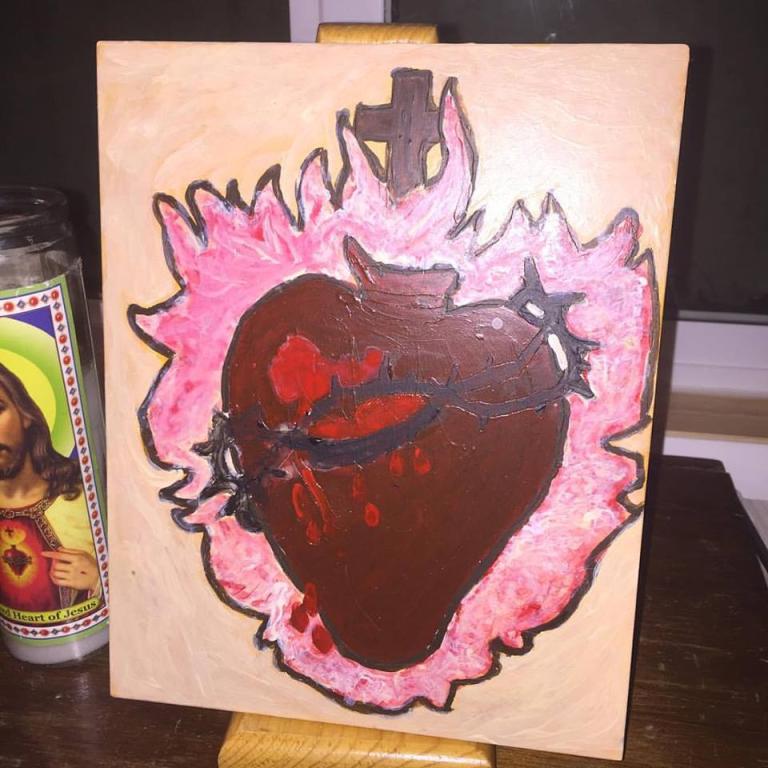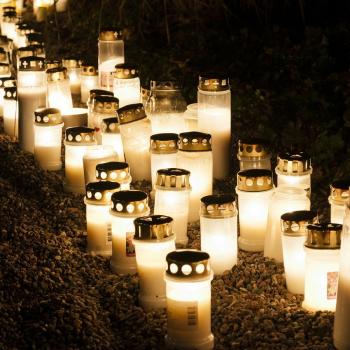Allow me to tell you a story. A few years ago, I went through the worst period of my life so far, a time of personal suffering that I pray to God I never will have to through again. A painful divorce resulted in a move away from my children so that I could get a job that would cover their insurance. I gave up friends and a sixteen year career as a Presbyterian minister to enter the Catholic Church.
Needless to say, I didn’t enter the church with a shout of triumph, profound theological revelation or with the belief I would somehow “add” to the life of the Catholic Church. Rather, I crawled through the door, full of spiritual and emotional bullet holes, and bled out all over the doorstep. I came because I needed a hospital, and in the arms of the Catholic Church, I discovered a theology of suffering, that is, God suffers with us, that would start to heal me.
But I started to heal wrong and became obsessed about my own personal pain. My recovery was and still is ugly. I soaked up only a partial understanding of Christ’s suffering, that is, how it pertains to my own personal wounds. The idea of helping people and engaging with their pain seemed ludicrous. I didn’t have time for it and I didn’t have the strength. All I cared about was my own personal healing.
This was not, inherently, a bad thing. There are times we must take a step back and get healthy. But while I took the step back, I didn’t want to take anymore steps forward. I isolated myself in South Bend, Indiana, trying to avoid contact with people, not engaging with the wider world. I surrounded myself with a cocoon of protection that only let people, places and things into my life that I considered “safe.”
I think of this time when I consider the ideas expressed in Rod Dherer’s book, The Benedict Option. For those who don’t know, he argues that because western culture is dying an ugly death, Christians should huddle together in little communities, avoid engagement with the world and social media, and wait for it to all explode so we can reemerge to rebuild Christian culture.
I get the impulse. For wounded and tired Christians and Catholics, this sort of thing can be very tempting. Up until two years ago, I would have found it very appealing. The last thing I wanted to a do is engage with the world and with the other people’s suffering, bad theology or sin. I had my own problems.
And yet, what I discovered in my own life is such thinking is absolute poison to my Christianity. It tramples on a full orbed understand of the Theology of Suffering. In the book of Isaiah, chapters 52 and 53, the songs of the Suffering Servant have spoken to Jews and Christians for over two thousand years. For Jews, these passages are personifications of the nation of Israel and their long history of suffering. And in them, they find comfort that suffering has a purpose despite all the terrible things they’ve endured.
Christians see sufferings of Christ come to a climax on the cross. Theologians, Jewish and Christian, argue back and forth as to what is the proper way to view them. But Catholic Christians have always believed these passages not only talk about Christ but also God’s people, found in the church. We are called to participate in the sufferings of Christ not only for our own redemption, but also for the redemption of the entire world.
Oddly, at least to Catholics, I didn’t discover this idea in the work of a Catholic theologian. Rather, I found it in the work of the oddest Inkling, Charles Williams, a high church Anglican. He writes in his novel Descent into Hell that:
If you want to live in pride and division and anger, you can. But if you will be a part of the best of us, and live and laugh and be ashamed with us, then you must be content to be helped. You must give your burden up to someone else and you must carry someone else’s burden.
To participate in the suffering of others, we can’t run and hide, as the Benedict Option would require. I tried that in my own life. I wanted to have my own personal Catholicism, hide it away and keep it. The problem is, when you do that, it becomes disconnected from Christ and His very life. He came to suffer and take suffering into the divine character of God. And in this, he entered into the suffering of the world and commands all who follow Him to do the same. When I tried, my faith rotted and spoiled into my own selfish personal self help mantra.
When Jessica came along and we started Sick Pilgrim, for me, it became a push back into the world of other people’s suffering. At first, I didn’t want to go, because coming back into the light exposed a lot of my own personal selfishness and pride. Combine this with gazing into the face of other people’s suffering, and it makes me want to find an isolated cabin in the northern woods and never came out.
But Christ says otherwise, and if I love him, I will obey. When he says take up your cross and follow me, he means that I must take up the cross of others. It can’t be avoided. The pain of others belongs to me if I claim to follow Christ. This means that hiding out is never an option. I must step in the shit and smell it on my shoes. I must feel the blood on my cheeks and hands. I must lay down on hard surfaces. I must be with people I don’t really like or understand. I must be in messy situations that may even cause devastating pain.
We must incarnate in the world and be a part of its pain and redemption, even if it means we could lose our way from time to time. This all sounds dangerous. It most certainly is. But that’s the call of Christ–not a call to “protect Western Civilization” or “Christian culture,” but a call to risk it all for the sake of the redemption of the world. We must risk our children as we teach them to engage with sinners like themselves. We must risk our self respect, our reputations, and everything we hold dear.
This can’t be done via the Benedict Option. It’s not possible. Dreher’s ideas aren’t just bad, they’re dangerous to the soul–because they’ll keep us from our most important call as Christians, to Christ by loving others. When we avoid that call, we avoid the only possible way to transform ourselves and the culture around us: the radical love of Christ’s suffering.













